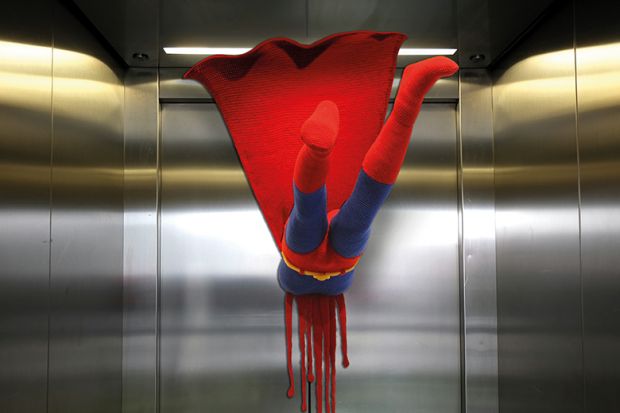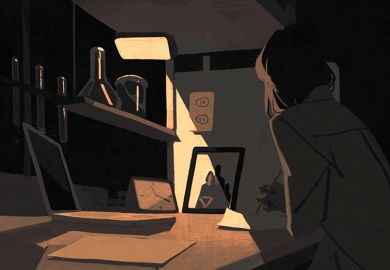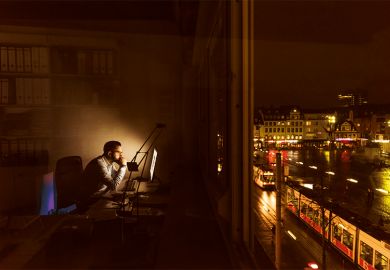It is an adorable story. A New York University psychology professor picks up his children from daycare and rushes home to teach his online class. But the elevator gets stuck. Despite a bad connection, he manages to dial into the Zoom meeting and improvise most of the lecture while he waits to be rescued. After all, the midterm is the following week and he cares about his students.
Jay van Bavel’s tweet thread about his adventure went viral last month. At last count, it had more than 28,000 likes, with commenters praising him for his passion and dedication. His students, they said, will never forget this example. Some called him a “legend” or a “superhero”.
It is not hard to see why his anecdote struck a chord. The Covid-19 pandemic has demanded extraordinary resilience from a wide swathe of society. Those teaching (and learning) in person face the danger of infection, while those who have switched to online have had to learn new pedagogical techniques and master digital tools on the fly. They have also had to get their heads around arduous new procedures for everything from room planning to getting a form signed – all while simultaneously supporting their students through anxiety and personal loss, home-schooling their own children and/or caring for at-risk family members, friends or neighbours. A professor teaching via phone from a broken elevator captures the absurd levels of perseverance that working life in the Covid era can require.
Yet when I read that Twitter thread and its responses, I went cold. What does it say about academic labour culture that a tenured professor who had an objectively good reason to cancel a class did not even consider the option? One of his respondents tweeted that she had sent her students lesson plans from the hospital where her elderly mother was being treated for Covid-19. I wondered: can we not allow ourselves a break, even during an emergency, even when our families need us most?
Then again, it has become hard to judge what even counts as an emergency any more. Adjusting to a perpetual state of crisis means that every new difficulty is simply another challenge to be met. After all, as van Bavel put it, “others have it worse”.
Compared with many lines of work, academics are indeed lucky. While some industries have largely been shut down for the past six months, the online option has allowed higher education to continue, albeit in reduced and disappointing form. At the same time, the poor separation between work and the rest of life that already plagues academe has intensified. As a friend of mine put it brightly, the good thing about teaching remotely is that it’s possible to work even when sick.
What is the cost of ever-intensifying workplace heroics? Many people have no choice about working even when the job is nearly impossible, their health is tanking, or their family is in crisis. That is true in academe, too, for those whose jobs are insecure. But some of us do have a choice. When we decide to work anyway, we communicate to our students, employees and junior colleagues that this is the standard to which they are also held. We might think of ourselves as kind teachers and understanding supervisors, and we may even give wise advice on self-care and work-life balance. But what we model is relentless self-sacrifice.
Here is my confession. I used to show up to work sick or in pain on a regular basis. Once, the pain was so intense that I nearly fainted in class. But when my students and research assistants brought their colds to the university, I would lovingly chew them out for not getting the rest they needed. All of us would take ages to get better because we kept exhausting ourselves and spreading our germs around.
The irony was that I work in Germany, where getting a doctor’s note is commonplace. But after years of studying and teaching in the US, I had internalised American “weekend warrior” culture.
Was I really leading a great seminar when I was ill? Perhaps. Adrenalin can do wonders. But my students would have survived a cancelled class. I thought I was teaching them the course material, but what I really taught them was this lesson: ignore your body’s needs. While you’re at it, ignore your family and your soul. Nothing ever goes above work, ever. Even doing mediocre work and killing yourself for it is better than a reasonable balance. Because it shows dedication.
At the same time, if the pandemic has taught us one thing, it is that there are no right answers. There is profound psychological and social value to keeping a sense of normalcy even in the midst of a catastrophe, especially when there is no end in sight. The professor caught in an elevator made the best decision he could under the circumstances. I hope, however, that we can all do a better job of recognising the choices before us.
Irina Dumitrescu is professor of English medieval studies at the University of Bonn.
Register to continue
Why register?
- Registration is free and only takes a moment
- Once registered, you can read 3 articles a month
- Sign up for our newsletter
Subscribe
Or subscribe for unlimited access to:
- Unlimited access to news, views, insights & reviews
- Digital editions
- Digital access to THE’s university and college rankings analysis
Already registered or a current subscriber? Login








